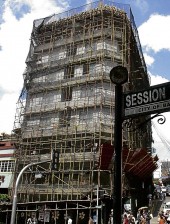
AT EIGHT stories high, this building may be the tallest to rise in Baguio City and one that prompts city officials to take a second look at the summer capital’s zoning laws that barred buildings more than six stories tall following the 1990 earthquake. EV ESPIRITU / INQUIRER NORTHERN LUZON
BAGUIO CITY—Just how high should the Baguio skyline rise 22 years after buildings in the summer capital were toppled by the 1990 Luzon earthquake?
It’s an issue the city council wants resolved as it studies how to reclaim control of high rises that are proliferating here.
At a regular session on Sept. 3, the council discussed the difficulty of enforcing a uniform building height standard, owing to new buildings or ongoing building projects that were allowed by the Department of Public Works and Highways (DPWH) and other national agencies to exceed local and national height regulations.
The Baguio zoning ordinance limits the height of commercial buildings at 19.5 meters or 6 stories, while the National Building Code of the Philippines (Presidential Decree No. 1096) sets a 5-story ceiling, said Oscar Flores, city building officer.
Flores said some building projects are as tall as 8 or 9 stories. Their owners skirt the local ordinance by seeking exemptions from the National Building Code Development Office of the DPWH or from the Housing and Land Use Regulatory Board.
One of the new structures that drew the council’s attention is an eight-story building that is near completion on downtown Session Road. It is the tallest structure among 32 buildings lining the historic road.
Flores said the building owner already violated the building permit by exceeding six stories, and may face a lawsuit, but penalties for these offenses are often no more than a P10,000 fine.
The new building’s owner also managed to secure an exemption from the DPWH that allowed him to raise the structure by another two floors because of an endorsement purportedly from the office of the city mayor, Flores told the council.
Quoting the exemption notice issued on June 28 by Emmanuel Cuntapay, director of the National Building Code Development Office, Flores said the DPWH believed the council was about to issue a new zoning ordinance that would increase the height limit for Session Road buildings.
But the council is not pursing Session Road’s reclassification, said Councilor Perlita Chan-Rondez, rendering the DPWH exemption flawed.
City Hall records show that the city government is updating its comprehensive land use plan and zoning ordinance, which may upgrade the building heights of certain commercial districts in Baguio.
The local real estate sector sought improvements to the zoning policies, including leniency in building 12-story dormitories to address a housing backlog.
Councilor Isabelo Cosalan, chair of the council’s committee on urban planning and land use, said setting a limit to the city’s skyline not only considers Baguio’s geology, which is classified as landslide-prone, but also the impact that buildings generate on human and vehicular traffic, on resources like water and energy, and on peace and order.
The proposed land use and urban development plan has been returned to the city development council for review because “more attention and efforts should be given to planning,” he said.
“The exemptions to building heights have been justified by loopholes [in the law and the system] governing development. There is a proper place for high-rise buildings which must be determined first before we can start development,” he said.